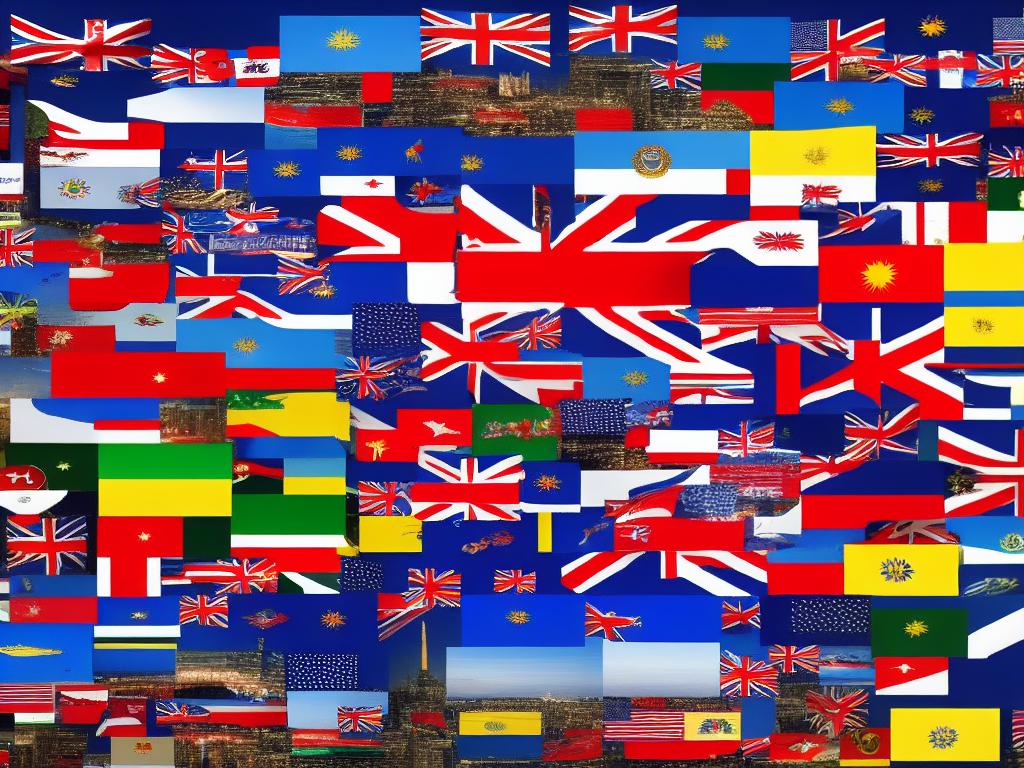Crikey, we’re about to delve into a veritable linguistic adventure that ventures into the intriguing realm of British English vocabulary, cobber. Oftentimes, the Queen’s English, as it is colloquially known, can be as diverse as the people that use it, and it varies vastly from its transatlantic cousin – American English. Through a fascinating journey that explores common language disparities, the ubiquitous slang and everyday vernacular, the rich tapestry of regional dialects, and the fascinating evolution of British English, we’ll endeavour to unravel the quintessential nature of British English, blimey!
Differences between British and American English Vocabulary
Introduction: The Curious Case of Transatlantic English Dialects
With a shared origin, British and American English dialects carry similar structures and mostly mutually intelligible meanings, yet intriguingly diverge in vocabulary, spelling, and pronunciation. This can sometimes lead to confusion and at other times, amusement. Here we unravel some of the essential contrasts related to vocabulary specific to British English.
Different Words, Same Meaning
It’s fascinating to observe how simple everyday items have different names in British and American English. In Britain, when referring to a man’s formalwear, one might say ‘trousers’, but in America, they’re called ‘pants’. Similarly, ‘sweets’ in Britain are ‘candy’ in America. If you were to visit a ‘chemist’ in Britain, you’d be visiting a ‘pharmacy’ in America. These language quirks show how the same objects are understood and referred to in diverse ways between the two dialects.
Same Words, Different Meanings
Equally captivating is when identical words carry different connotations. A classic example is the word ‘rubber’. In Britain, this refers to the small object used to erase pencil markings. However, in America, it might be interpreted as slang for a condom, potentially leading to awkward misunderstandings. Similarly, ‘to table’ a discussion means to postpone it in American English but to bring it forward in British English.
Spelling Distinctions
Spelling variations are also notable. British English prefers ‘-ise’ endings – as in realise – while American English opts for ‘-ize’ – realize. Additionally, words like ‘colour’ in British English become ‘color’ in American English, signifying the omission of ‘u’ in the American version.
Verb Variations and Tenses
Verb tenses and their usage are another area of divergence. Brits use ‘have got’ in certain contexts where Americans would simply use ‘have’. For instance, ‘I have got a headache’ in British English would be ‘I have a headache’ in American English.
Pronunciation Differences
Pronunciation nuances add an audible distinction between the dialects. Certain vowels and consonants are pronounced differently, as in the case with ‘schedule,’ where the initial ‘sch’ is pronounced ‘shed’ by Brits, while Americans pronounce it ‘sked’.
Embracing Linguistic Diversity: Celebrating British English
The linguistic nuances that distinguish British and American English showcase the extensive diversity woven into the fabric of the English language. This versatility and dynamism is a testament to its ability to adapt and evolve. As these two dialects are rooted in common ancestry and are widespread, comprehension between them is facilitated. The variations that we will explore here not only enrich the English language but further enliven it, demonstrating that it is a vibrant, living entity, ever receptive to the subtle influences of the various cultures that utilise it.

Slang and Informal British Vocabulary
A Journey through British Vernacular: Understanding Local Slang
British English, in particular, is renowned for its unique slang and vibrant expressions which often mystify those unfamiliar with it. The use of such colloquial terminology is a common practice throughout Britain, and it constitutes a significant part of the nation’s cultural tapestry. It can often be heard in casual conversations and can be found woven into British at its most popular forms like media and literature.
Diverse and Varied Slang: From ‘Ace’ to ‘Zonked’
The diversity of British slang reflects the rich tapestry of regional dialects and historical influences. For instance, ‘Ace’ is commonly used to express something excellent or impressive. ‘Barmy’, on the other hand, refers to someone who is mad or crazy, derived from the old Viking word ‘Barm’ meaning ‘froth or foam from fermenting liquor’. The term ‘Zonked’, another popular slang, could be used to describe someone exceptionally tired or exhausted.
Understanding British Idioms: Language’s Special Sauce
In addition to slang, British English is rife with idiomatic expressions. ‘Bob’s your uncle’, for instance, is a peculiarly British idiom which implies ‘there you have it’ or ‘problem solved’. ‘Full Monty’, another well-known idiom, indicates doing something completely or entirely. It’s speculated to be derived from Field Marshal ‘Monty’ Montgomery – a World War II hero, or a reference to a fully outfitted breakfast in Montague Burton, a clothing chain.
These unconventional expressions illustrate the richness of British English and often underpin the charm, humour, and quintessential Britishness that non-natives find fascinating.
Colloquial Expressions: The Everyday Language Spices
Colloquial expressions are a cornerstone of daily communication in Britain. Take ‘a cuppa’, for instance. It’s a shorthand for ‘a cup of tea’, an integral part of British social traditions. More intriguing ones such as ‘pop your clogs’, which actually signifies ‘to die’, lend a sense of lightness to grave topics.
Regional Slang: A Cultural Indicator
British slang also extends to regional dialects. Scousers (Liverpudlians) have a distinct vocabulary peppered with rhymes and humour. ‘Bevvied up’ implies being drunk and ‘made up’ translates to being very happy, in Scouse. Likewise, in Yorkshire, ‘bray’ means to beat or hit, and ‘chuddy’ refers to chewing gum.
Deciphering the mystery of British English slang, idioms and local expressions isn’t solely about mastering the language. It also involves gaining a deeper appreciation of the unique cultural and societal contexts that have influenced its formation, thereby providing an enriched understanding of the many facets of British life and heritage.

Regional Dialects and Vocabulary within the UK
Unravelling the UK’s Rich Fabric of Regional Dialects and Vernacular
The cultural and linguistic vibrancy of the United Kingdom is truly a rarity. This nation, steeped in history and comprising England, Scotland, Wales, and Northern Ireland, has nurtured an array of regional dialects over hundreds of years. These dialects, each carrying a unique set of vocabulary and distinct linguistic features, reflect the rich diversity of the UK.
The North-South Divide: An Excellent Example of Geographical Influence on Dialect and Vocabulary
A clear demonstration of geographical influence on dialect and vocabulary within the UK can be seen in the North (including the Midlands) and the South of England. The North-South Divide is something of an infamous concept in England, influencing not just economic conditions and cultural identities, but also dictating how the English language is spoken.
In the Northern English dialects, unique words such as ‘bairn’ for ‘child,’ ‘ginnel’ for ‘alleyway,’ and ‘fettle’ for ‘condition or state,’ are commonly used. The pronunciation of words also differs in this region – bath, grass, and dance are pronounced with short ‘a’ sounds, unlike the South where a longer ‘ah’ sound is used.
In stark contrast, Southern English vocabulary includes ‘jam sandwiches’ for ‘jam buns,’ ‘pavement’ instead of ‘footpath,’ and a trolley is integrated instead of a ‘shopping cart’ or a ‘buggy.’ The infamous ‘r’ sound is also more pronounced in Southern English, distinguishing it from its Northern counterpart.
Scottish, Welsh and Northern Irish Dialects: A Different Linguistic Persuasion
Crossing over the border to Scotland, Wales and Northern Ireland introduces distinct dialects influenced by Gaelic and Welsh languages. Scots use ‘wean’ for ‘child,’ ‘bonny’ for ‘pretty,’ and a ‘burn’ is a ‘stream.’
Wales, where Welsh is recognized as an official language alongside English, boasts a dialect rich in unique vocabulary and pronunciation. ‘Lush’ is used to describe something excellent or attractive, ‘cwtch’ meaning a hug or loving embrace, and ‘bap’ refers to a bread roll.
Then there’s Northern Ireland, where the accent and dialect are heavily influenced by the Irish language, leading to vocabulary additions such as ‘craic’ for fun or entertaining conversation, ‘wee’ for ‘small’, and ‘yoke’ for ‘thing’ or ‘object.’
A Conclusive Highlight: The Language that Binds, Dialects that Define
The multifaceted regional dialects within the UK contribute to the expansive variety of British English, offering a distinct edge to its vocabulary. Far from segregating, these variations in speech knit together individual regional identities, thereby creating a rich tapestry of linguistic diversity that weaves together the cultural fabric of the nation.

The Evolution of British English Vocabulary
A Step back in History: The Bedrock of British English Vocabulary
The genesis of the English language or Old English traces back to the 5th and 6th centuries, introduced to Britain by the tribes known as Anglo-Saxons from present-day Germany and Denmark. Prevalently influenced by Germanic and Norse languages, Old English was characterised by its highly inflected nature. Words that have stood the test of time from this era include ‘house’, ‘wife’, and ‘strong’.
The timeline of English history is marked by conquests and cultural interactions. Among these, the Norman Conquest of 1066 had a game-changing influence, ushering in a wave of Latin and French words into English vocabulary. Middle English, derived during this era and recognisable in works such as the renowned “Canterbury Tales” by Geoffrey Chaucer, has bequeathed us with words like ‘courage’, ‘honour’, and ‘royal’.
The Influence of the British Empire and Colonialism on English Vocabulary
The British Empire’s colonial past significantly influenced British English. As Britain established colonies across the world, words from different continents and cultures began to creep into the English language. India, one of the most significant colonies, contributed a considerable number of words. Terms such as ‘pajamas’, ‘shampoo’, and ‘bungalow’ trace their roots back to this era of Indian influence.
In Africa, words like ‘safari’ from Swahili and ‘zombie’ from West African languages found their way into English. From the Americas, words like ‘potato’, and ‘tobacco’ entered the English language.
Migration and its Influence
The post-war period saw substantial scale migration to Britain. Communities from the Caribbean, India, Pakistan, and later Bangladesh brought with them their languages, significantly influencing English. Words like ‘duppy’ (ghost in Jamaican Creole) are now widely recognized in British English.
The Globalization Era and its Impact
Globalization has accelerated the rate at which British English absorbs words from other languages. American English has been notably influential, with words like ‘movies’, ‘teenager’, and ‘okay’ now firmly entrenched in British usage.
The internet era, characterized by the rapid exchange of information across borders, has proven to be a melting pot of languages, further boosting the evolution of British English. Words and phrases such as ‘selfie’, ‘hashtag’, and ‘fake news’, predominantly from American English, are now part of everyday use in Britain.
Conclusion – The Dynamic Nature of British English Vocabulary
The richness and diversity of British English vocabulary highlight the dynamic and evolving nature of the language. Rooted in a turbulent history of invasion and migration, influenced by colonial exploits and global interaction, British English continues the tradition of absorbing and adapting words from other languages.

Jolly good show! We’ve traipsed through the thrilling chronicles of British English, explored its nooks and crannies, and emerged with a sparkling appreciation for the dynamic nature of this grand tongue. While the variations between American and British English, the mottled usage of slang and colloquial expressions, the diverse regional dialects within the British Isles, and the compelling evolution of the language paint a rich linguistic tapestry, they also underscore the complexity and vibrancy of the British English language, in all its majesty. British English is quintessential to the fabric of the people that speak it; one might say it’s the bee’s knees!